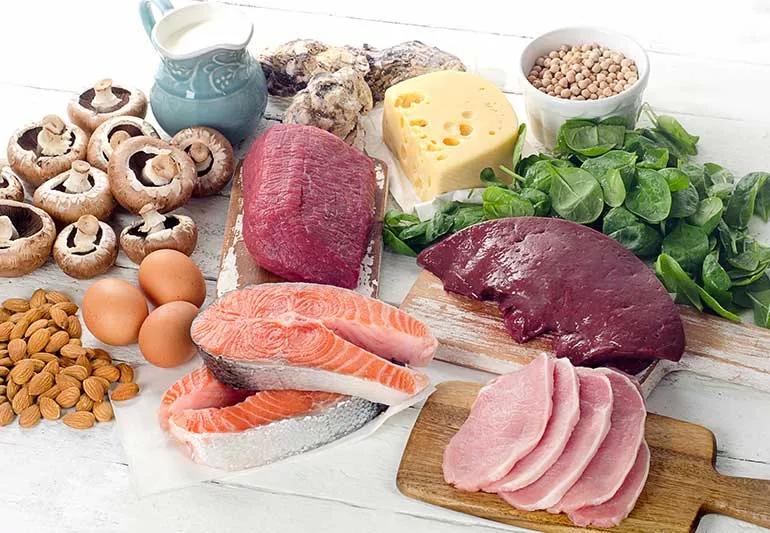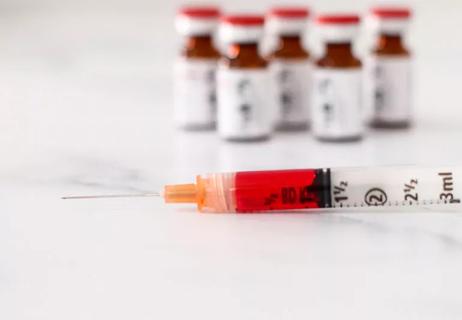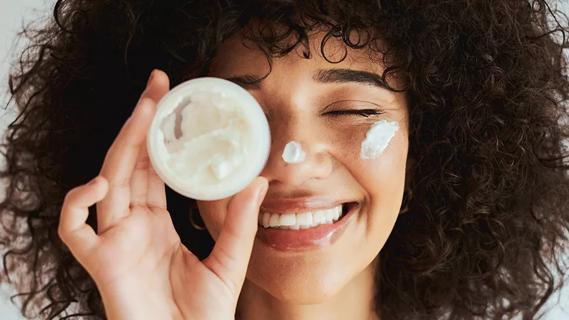This vitamin helps access energy, prevent migraines and anemia, and protect your vision

Get to know your B vitamins: Meet vitamin B2, also called riboflavin. B2 is one of eight B-complex vitamins. These vitamins work together to change carbohydrates from foods into fuel for your body. Vitamin B2 also helps release energy from proteins.
Advertisement
Cleveland Clinic is a non-profit academic medical center. Advertising on our site helps support our mission. We do not endorse non-Cleveland Clinic products or services. Policy
In other words, riboflavin takes your whole-wheat bagel and cream cheese and turns it into energy to get you through that next meeting (even if it could have been an email).
“Riboflavin is an essential micronutrient that helps cells develop and work well,” says registered dietitian Kayla Kopp, RD, LD. “Healthy bacteria in your gut microbiome make small amounts of riboflavin. But your body needs more to function. That’s why it’s important to get enough of this B vitamin in your diet every day.”
Your body needs vitamin B2 (riboflavin) to break down carbohydrates from foods. This process helps your cells get the energy they need to function.
Studies suggest vitamin B2 also offers these four health benefits:
Researchers believe there may be a link between riboflavin, mitochondrial cell function and migraines. Mitochondria are your body’s energy makers. Riboflavin may also ease stress and minimize nerve inflammation that contributes to migraines.
In one study, people who took 400 milligrams of vitamin B2 every day for three months had fewer migraines each month than those who took a placebo. A different study found similar effects in children. Even better, the children saw a decrease in migraine pain for up to 18 months after they stopped taking riboflavin supplements.
Advertisement
Based on findings like these, the American Academy of Neurology and the American Headache Society say people with chronic migraines may benefit from taking daily riboflavin supplements as a preventive measure.
Some experts believe that riboflavin prevents cancer-causing substances called carcinogens from damaging cells. But research findings are mixed.
A Women’s Health Initiative Observational Study found that participants who got more riboflavin in their diets had a lower risk of colorectal cancer. But other studies haven’t shown a link between the two.
Another study investigated the effect of riboflavin on the risk of lung cancer in people who smoke. But the findings were inconclusive, and the researchers said the results needed more investigation.
“If you’re at risk for certain cancers due to family history or other factors, talk to your healthcare provider to see if you should increase your intake of riboflavin,” advises Kopp. “And, of course, get the screenings and tests your provider recommends.”
A diet rich in vitamin B2 and other B-complex vitamins may lower your risk of cataracts. These cloudy areas on your eye lenses cause vision problems, such as blurred or double vision. People with severe, prolonged vitamin B2 deficiency are most at risk for developing cataracts.
Riboflavin helps your body absorb iron. Not getting enough riboflavin puts you at risk for iron-deficiency anemia.
“People with anemia may feel extremely tired, look pale and bruise easily. They don’t have enough iron to make healthy red blood cells,” explains Kopp. “Red blood cells carry oxygen throughout your body.” Pregnant women and children are most at risk for anemia due to riboflavin deficiency.
The amount of riboflavin or vitamin B2 (measured in milligrams or mg) you need each day depends on your age, sex and whether you’re pregnant or breastfeeding.
Source: National Institutes of Health
| Age | Recommended amount |
|---|---|
| Birth to 6 months | 0.3 mg |
| Infants 7 months to 12 months | 0.4 mg |
| Children 1 year to 3 years | 0.5 mg |
| Children 4 years to 8 years | 0.6 mg |
| Children 9 years to 13 years | 0.9 mg |
| Teens 14 to 18 years (female) | 1.0 mg |
| Adult females | 1.1 mg |
| Teens 14 to 18 years (male) | 1.3 mg |
| Adult males | 1.3 mg |
| Pregnant teens or adults | 1.4 mg |
| Breastfeeding teens or adults | 1.6 mg |
| Age | |
| Birth to 6 months | |
| Recommended amount | |
| 0.3 mg | |
| Infants 7 months to 12 months | |
| Recommended amount | |
| 0.4 mg | |
| Children 1 year to 3 years | |
| Recommended amount | |
| 0.5 mg | |
| Children 4 years to 8 years | |
| Recommended amount | |
| 0.6 mg | |
| Children 9 years to 13 years | |
| Recommended amount | |
| 0.9 mg | |
| Teens 14 to 18 years (female) | |
| Recommended amount | |
| 1.0 mg | |
| Adult females | |
| Recommended amount | |
| 1.1 mg | |
| Teens 14 to 18 years (male) | |
| Recommended amount | |
| 1.3 mg | |
| Adult males | |
| Recommended amount | |
| 1.3 mg | |
| Pregnant teens or adults | |
| Recommended amount | |
| 1.4 mg | |
| Breastfeeding teens or adults | |
| Recommended amount | |
| 1.6 mg |
Meat and fortified products like cereal and bread are the main sources of riboflavin. You can also get vitamin B2 from:
Not really. There aren’t any known side effects or risks of getting too much riboflavin. “Riboflavin is a water-soluble vitamin, which means your body flushes out any extra amounts when you pee,” says Kopp. But a diet high in riboflavin can make the color of your pee bright yellow.
Advertisement
Flavin is a variation of the Latin word “flavous,” which means yellow. The bright yellow shade might look alarming, but as Kopp notes, “This color is simply a sign that your body is getting rid of the vitamin it didn’t use and can’t store.”
Probably not. “I recommend eating lots of riboflavin-rich, healthy foods,” says Kopp. “But you could also take multivitamins that have B vitamins or B-complex supplements.” If you’re concerned about how much vitamin B2 you’re getting, your healthcare provider can order a blood test to check your riboflavin levels. If tests show you need more B2, head to the store and stock up on leafy greens, lean meats, dairy products and other riboflavin-rich foods.
Advertisement
Learn more about our editorial process.
Advertisement

The popular skin care ingredient can help smooth, brighten and strengthen your skin

Though it was once used as a cholesterol-lowering medication, niacin is no longer a recommended treatment

Some protein-containing foods are known to be good sources of biotin — but there are also likely other foods that just haven’t been studied yet

This essential nutrient helps convert food into energy, but don’t expect wonders for your nails and hair

This important B vitamin has benefits for your heart, brain and skin

Taking supplements with biotin can cause inaccurate lab test results

If you have low B12 or a true deficiency, these shots can work wonders

Pantothenol is a powerful moisturizer and can help repair damaged skin and hair

The tropical fruit is a good source of antioxidants and vitamin C

Most people fall asleep within 10 to 20 minutes, but if your experience is different, adjusting your sleep schedule may help

Exploring your hidden side can lead to better understanding of what makes you tick